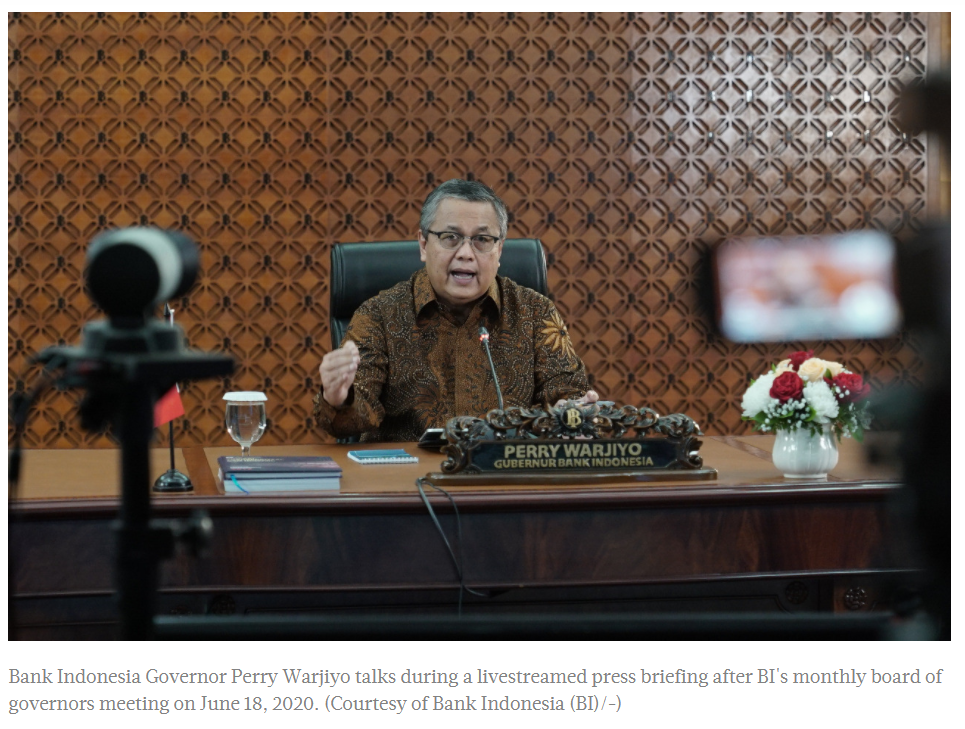BI to remain standby buyer for Indonesia’s government bonds in 2021
Bank Indonesia (BI) has expressed its commitment to continue its role as a standby buyer for government bonds until 2021 to help fund the state budget deficit during the pandemic.
BI Governor Perry Warjiyo said on Wednesday that the central bank would continue its role as a non-competitive bidder in government bond auctions next year, while assuring that it would have the capacity to do so.
“We will only bid when the market is not capable of absorbing [the bonds]. We will have further discussion with the Finance Minister on the market capacity and the government funding strategy,” he said during a livestreamed press briefing.
The government has projected the budget deficit to reach Rp 971.2 trillion, or 5.5 percent of gross domestic product (GDP), in 2021 as the government looks to continue its stimulus spending to support economic recovery. The government plans to issue more sovereign debt papers (SBN), global bonds, retail bonds and sharia-compliant bonds to fund the deficit.
Finance Minister Sri Mulyani Indrawati said on Aug. 14 that the government would continue to work with the central bank and allow it to buy government bonds directly at auctions as a standby buyer.
Perry assured that the central bank would have the capacity to be the standby buyer next year because it had only bought a total of Rp 42.96 trillion (US$2.91 billion) in government bonds from the market since April.
“The figure is only a small fraction of the total amount of government bonds issued to the market,” he said.
Data from the Finance Ministry’s financing and risk management office show that the government issued a total of Rp 630.5 trillion in government bonds in the first half of this year, or 41.2 percent of the total gross issuance in 2020, Kontan reported.
Perry also announced that the central bank’s board of governors had decided to maintain its benchmark interest rate — the seven-day reverse repo rate — at 4 percent after lowering it four times this year by a total of 100 basis points (bps).
Lending and deposit facility rates were also kept at 3.25 and 4.75 percent, respectively.
“The decision is consistent with maintaining external stability amid low inflation that is expected to persist until the end of the year,” he said, adding that BI expected inflation to fall at around 2 percent this year.
BI is also committed to continuing its quantitative easing by providing liquidity for banks by lowering the average primary reserve requirement (GWM), and for the government by being a standby buyer and participating in bond private placement.
In a burden-sharing scheme agreement with the government, the central bank has purchased the government bonds through a private offering. The one-off policy that was only agreed for this year was aimed to help finance the widening budget deficit that was caused by the government’s COVID-19 response.
“So far, we’ve bought Rp 82.1 trillion worth of government bonds through private placement,” he said.
Mirae Asset Sekuritas economist Anthony Kevin lauded the government’s decision to allow BI continue its role as standby buyer as it could help to improve market confidence in government funding next year.
He also said BI’s call to maintain the rate at 4 percent was the “correct call” despite wide-open room for another round of policy rate cuts.
“I believe BI should refrain from [lowering rates] to maintain the interest rate differential in order to keep the rupiah on the appreciation path against the US dollar,” he said.
He also added that the high trade balance surplus, low inflation and narrowing current account deficit could also help strengthen the rupiah against the greenback to Rp 14,400 per US dollar by the end of the year.
The rupiah closed at Rp 14,770 per US dollar on Wednesday, 0.4 percent stronger than the day before. However, it has depreciated more than 1 percent over the past month.
Trimegah Sekuritas economist Fakhrul Fulvian said the central bank’s decision to maintain rates would help to appreciate the rupiah since fears over huge monetary expansion could hamper recovery of the currency.
Although he agreed that BI would receive a positive response from the market for its plan to continue as a standby buyer, he said it would ultimately depend on the central bank’s exit strategy from the burden to support the government.
“It’s very important for BI to communicate to the market on its exit strategy once the economy recovers from the crisis,” he said.
Source: https://www.thejakartapost.com/news/2020/08/19/bi-to-remain-standby-buyer-for-indonesias-government-bonds-in-2021.html


 English
English




